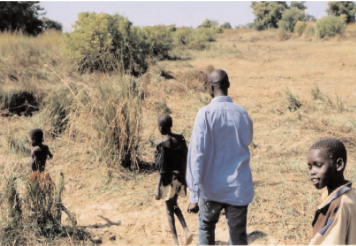Dominic Arou is sitting on a sack of rice in the cavernous hold of a sixties-era Russian cargo plane, full of food and wooden posts and bicycles, and the plane is astoundingly loud. Dominic’s ears are stuffed with blue tissue paper, as are half of the passengers’ ears, to dull the roar of the engine as it shakes the fuselage. But Dominic’s tissue paper isn’t stuffed enough—it’s sticking out, perpendicular to the length of his face, looking like very long blue ear-hair, or frozen steam. It’s dark in the cargo hold because all of the plane’s windows are covered; the plane is that full. In the cargo hold is a Sudanese man, named Simon, who is on his way to Nuba, the mountainous central region of the country; two Kenyan aid workers, also on their way to Nuba; myself and my brother, who’s videotaping some of the trip; and Dominic Arou, who has not been to his village in sixteen years, and who is going home.
We six are sitting on supplies that will be dropped at Nuba. One of the Kenyan aid workers, who is wearing a mechanic’s jumpsuit (he is naked underneath and the zipper is down below his waist) is sitting on a large rolled piece of insulation. He looks bored and is not bothered by the noise. The noise is so great that no one can hear what anyone else is saying, and so all communication is done with hand signals and notes written on small bits of paper. To pass the time, we’re giving each other words to unscramble.
Dominic is drinking from a small bottle of orange Fanta, purchased just before the plane took off, from a small snack bar at a tiny airport in a small town in Kenya called Lokichoggio. Dominic is wearing one of my shirts, because Dominic’s luggage is still in the Newark airport, through which he passed eighteen hours before, en route to Nairobi from Atlanta. The shirt he has borrowed is a yellow Western-style shirt, with snaps instead of buttons. It looks better on Dominic than it ever did on its owner, though it’s an incongruous outfit to be wearing in southern Sudan. On his feet are very nice newish white high-top sneakers, and on his legs are jeans, also borrowed from me.
He is looking good, and knows it, and smiles a lot knowing it. Dominic Arou’s teeth are not perfect by American standards—and he insists he’s going to get braces someday soon—but still his smile is expansive and utterly convincing. There’s something easy about assuming that a young man—he’s about twenty-four, though there are no records to confirm it—who has seen so much, and narrowly avoided...
You have reached your article limit
Sign up for a digital subscription and continue reading all new issues, plus our entire archives, for just $1.50/month.
Already a subscriber? Sign in





